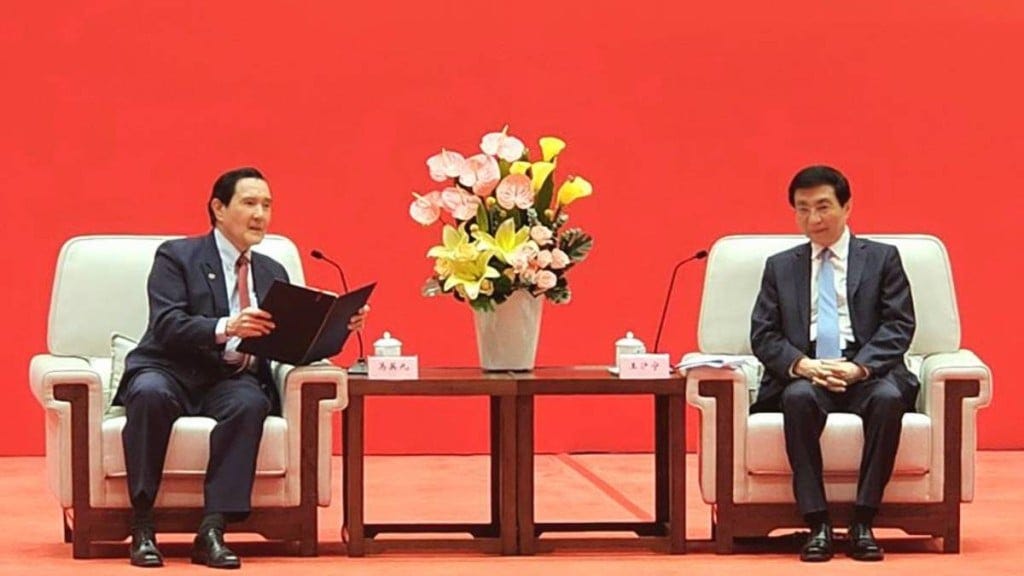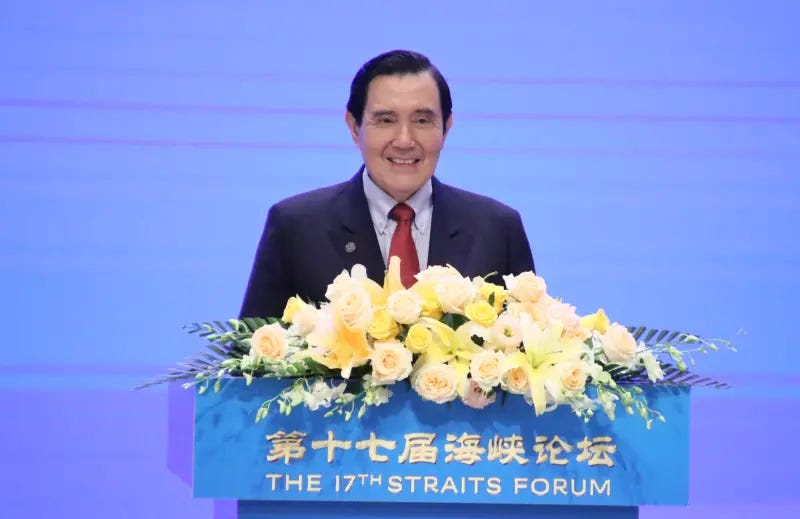Ma Ying-jeou's speech at 17th Straits Forum in the mainland
And why I keep covering the former Taiwanese leader in Pekingnology.
I’ve recently been asked why I frequently feature Ma Ying-jeou in Pekingnology. To give ample room to the criticism, two foreign journalists’ friendly reminders include
Ma Ying-jeou has made himself irrelevant here, lest the Chinese media gives you another impression. To constantly quote someone who lacks importance could be confusing for an international audience.
Taiwanese have decided he’s irrelevant. You certainly have a right to write about and analyze his policy positions. But believing he’s relevant to the future of cross-Strait discourse says more about your biases than it does about the current state of Taiwan-China relations.
Here is my response.
Ma Ying-jeou served as a two-term President of the Republic of China (2008–2016) and remains the most recent leader from the opposition Kuomintang (KMT) party to have held that office. Admittedly, several years removed from power, he is no longer an active participant in electoral politics or policymaking in Taipei.
Nevertheless, Ma’s engagements across the Taiwan Strait retain unique significance—a fact underscored by Taiwan’s current administration repeatedly voicing disapproval of his recent outreach to the mainland. Crucially, no sitting Taiwanese leader has visited mainland China since 1949, and Ma became the first former Taiwanese leader ever to do so, breaking that barrier in 2023. He is also among the very few Taiwanese politicians to have directly met Xi Jinping, first in a landmark 2015 summit and then again last year during a high-profile visit to the mainland. During these post-presidential visits, Ma has repeatedly secured audiences with senior mainland officials. In essence, the mainland continues to treat Ma as a figure of substantial influence in cross-Strait relations. Given this context, insisting that Ma is trivial in the cross-Strait context would seem peculiar.
For international audiences seeking clarity on Beijing’s Taiwan policy, Ma’s activities offer rare and valuable insights. His interactions with mainland leaders illuminate dynamics that Taiwan’s incumbent officials cannot provide. By examining Ma’s public statements, observers gain a clearer picture of Beijing’s strategies to engage—or, as Western narratives often frame it, influence—Taiwanese society. In my view, editorial aversion toward Ma reflects a broader tendency to dismiss the mainland’s legitimacy and agency in dealing with Taiwan, favoring emotionally satisfying but ultimately incomplete narratives in the West. The fact that Ma receives minimal attention in English-language coverage, and there is pushback even against his coverage in this substack, represents a bias - in my admittedly not unbiased view.
I do not claim privileged insight into Ma Ying-jeou’s thoughts beyond his public statements, but I genuinely doubt he views himself as a mere pawn in cross-Strait politics. Instead, I believe his efforts aim to foster peace and stability across the Strait—a goal of global significance given frequent characterizations of the Taiwan Strait as the most dangerous place on Earth, which has only gotten more dangerous in recent years.
Yes, nostalgia is also at play. I'd much rather see millions of mainland tourists visiting Taiwan annually and tens of thousands of mainland students enrolled in Taiwanese universities during Ma’s time, which rendered war unimaginable, rather than a cycle of provocations followed by retaliatory military drills around the island.
In that sense, let me double down by presenting his speech today in Xiamen, Fujian Province at the 17th Straits Forum, where he also met Wang Huning, a senior mainland leader.
Wang Huning, Standing Committee Member of the Political Bureau of the Central Committee of the Communist Party of China (CPC) and Chairman of the National Committee of the Chinese People’s Political Consultative Conference;
Song Tao, Director of the Taiwan Affairs Office of the CPC Central Committee; Zhou Zuyi, Secretary of the Fujian Provincial Committee of the CPC;
Distinguished guests and friends from Taiwan and the mainland, good morning and greetings to all!
I am honored to be invited to attend the 17th Straits Forum. As a communication platform for civil exchanges between the two sides of the Taiwan Strait, the Straits Forum has made an indelible contribution to promoting in-depth exchanges between the people on both sides and stabilizing the peaceful development of cross-strait relations over the past 16 years. I would like to express my highest respect and gratitude here.
This is my fourth visit to Chinese mainland, and my first visit to Fujian. Coming to Xiamen today, I am especially excited because Xiamen is not only just across the water from Taiwan, but also a place many Taiwanese people are familiar with. Whether in language, customs, cuisine, or the warmth of its people, we can feel many commonalities, making us deeply realize that the connection between the two sides of the Taiwan Strait is inseparable.
Historically, many of the ancestors of the Taiwanese people came from Fujian, especially from the Quanzhou and Zhangzhou areas. In our language, Minnan dialect is the common language of many Taiwanese; in our beliefs, Mazu faith is the spiritual and psychological pillar for many Taiwanese; in our food culture, “Buddha jumps over the wall” is a must-have dish at Taiwanese banquets, “satay sauce” is an essential condiment on the dining table, and “pickled radish eggs” is a homestyle dish that Taiwanese people have eaten since childhood. The ties between Fujian and Taiwan are not just historical imprints of the two sides, but also the inheritance of Chinese culture, a precious asset that both sides can continue to develop and protect together in the future.
When visiting Xiamen, I must mention the relationship between Kinmen and Xiamen. Kinmen is less than 10 kilometers away from Xiamen, and on clear days, you can see each other. This geographical proximity has not only fostered close historical interactions between the two places but also facilitated many civil exchanges and collaborations. For example, the water supply in Kinmen now largely relies on assistance from Fujian, and the world-famous Kinmen sorghum liquor is also brewed with Fujian’s water.
Since the opening of the “Mini Three Links,” transportation between Kinmen and Xiamen has become more convenient, driving tourism, trade, and people-to-people exchanges. Many Kinmen residents come to Xiamen for shopping or family visits, and many mainland citizens pass through Xiamen to visit Kinmen. Kinmen and Xiamen are a microcosm of cross-strait exchanges and a concrete manifestation of cross-strait peace.
Currently, although the development of cross-strait relations faces many difficult challenges, I firmly believe that the emotional and cultural connections and exchanges between the people on both sides cannot be severed. No political force can suppress or obstruct the sincere interactions between the people of the two sides, nor can they sever the natural affection that the Chinese people on both sides share as they come from the same root. I am deeply convinced that only through uninterrupted exchanges and understanding can we reduce misunderstandings, avoid misjudgments, build trust and consensus, and jointly find opportunities for cooperation and development. Only by adhering to the peaceful development of cross-strait relations, based on the “1992 Consensus and opposition to Taiwan independence,” deepening cooperation, and working together for the future, can we create a peaceful and win-win situation for both sides. This is the direction we must continue to work towards in the future.
In particular, youth exchanges between the two sides are crucial for the development of cross-strait relations. Our future lies in the hands of the young people, and the youth on both sides are the hope for the future of the Taiwan Strait. Over the past two years, I have led Taiwanese university students to visit the mainland three times, allowing them to better understand the development and current situation of the mainland. I have also observed that more and more young people are interested in studying, interning, and working on the mainland, with many successful cases of young people starting businesses. In recent years, I have met many Taiwanese youth who have come to Fujian to start businesses, whether in cultural and creative brands, agricultural products, e-commerce, technology, or new media industries, all of whom hope to create their own success here.
Only through continuous grassroots exchanges can we effectively reduce misunderstandings and hostility between the people on both sides. This is also the important mission of our “Ma Ying-jeou Foundation.” We not only hope for more Taiwanese youth to engage in exchanges on the mainland, but also hope that mainland people will come to Taiwan more. Over the past two years, I invited a delegation of faculty and students from mainland universities to visit Taiwan for the second time. In addition to visiting Taipei 101, they also visited famous spots like Taroko Gorge in Hualien and Sun Moon Lake in Nantou, engaging in discussions with university faculties and students, which received positive responses from various sectors on both sides. These exchanges and interactions can create mutually beneficial and win-win situations. I believe that this is also an important effect that events like today’s “Straits Forum” can have.
Finally, I would like to once again thank Chairman Wang Huning and Director Song Tao for bringing together people from all walks of life from both sides of the Taiwan Strait to contribute to our future. I also wish the 17th Cross-Strait Forum a complete success, and I wish everyone here good health, success in your careers, and happiness in your families!



